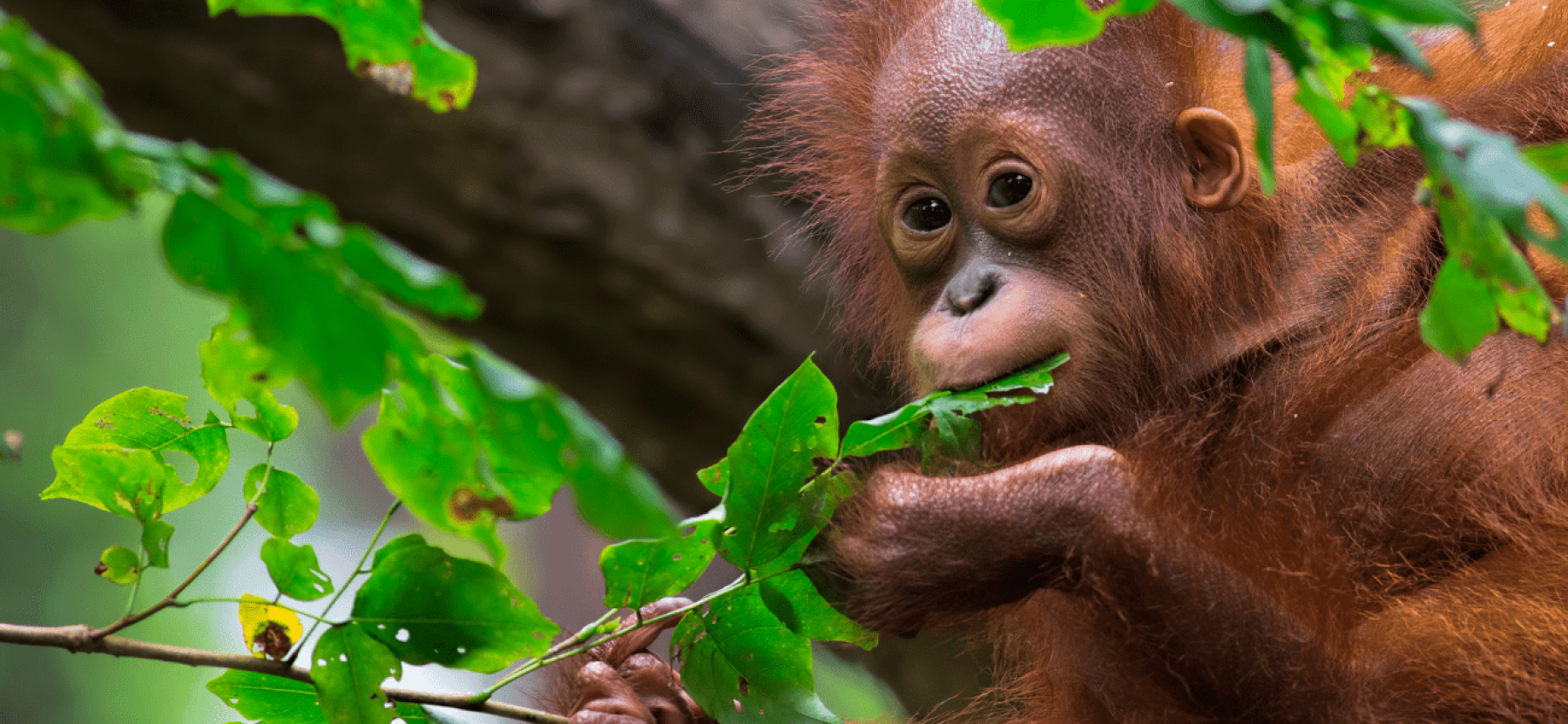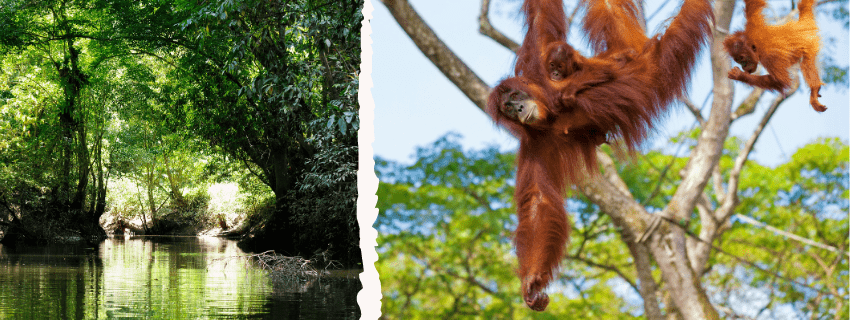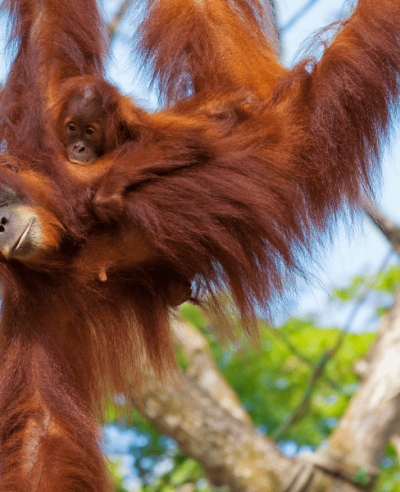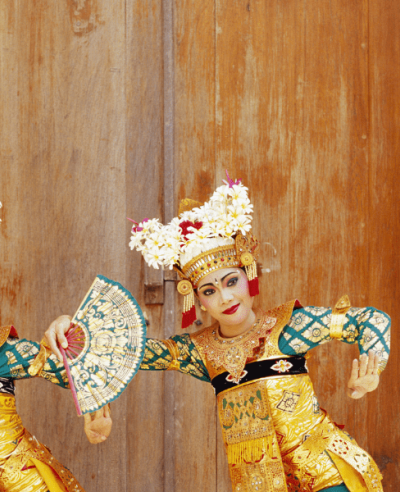
Borneo
Borneo
Borneo is a real hidden gem in Asia with some great wildlife spotting and trekkings. The island is lesser known by tourists but it is definitely worth exploring. Seeing Orang Utans in their natural habitat is a once-in-a-lifetime experience.
Discover Orang Utan
5 Days / 4 nights
Starting from: $450 USD per personA 5 days and 4 nights tour throughout the beauty of Indonesia’s most special destination, Sumatra. Once called “The island of gold”. Trek through the beautiful dense rainforest and get the chance to run into Sumatra’s most iconic inhabitant, the Orang Utan.
Pure Indonesia
12 Days / 11 nights
Starting from: $2,290 USD per personOur Pure Indonesia tour takes you to many of the highlights of Indonesia including a visit to Borneo and the Borobudur in Yogyakarta. You will get a great insight into the daily life of the Indonesian people on Java and Bali and you get to enjoy some delicious home-cooked meals.
Discover Borneo
You will encounter orangutans, gibbons, rare nose monkeys, and many more monkey species during a group trip through Borneo. Get to know these special monkey species and discover why the Malaysian population also calls the nose monkey Orang Belanda. Enjoy an adventurous walk through the jungle, wade through wide rivers, climb through dark caves and learn more about hunting techniques and medicinal plants. You can relax on one of the beautiful bounty beaches in Borneo. If you have not had enough adventure, you can get acquainted with the special underwater world of Borneo during a diving or snorkeling trip.

Practical information Borneo
Itineraries While we intend to adhere to the route described in your contract, there is a certain amount of flexibility built into the itinerary and on occasion, it may be necessary, or desirable to make alterations.
The contract is a general guide to the tour, region and proposed itinerary any mention of specific wildlife is by no means a guarantee that they will be encountered, as we can never guarantee what mother nature has to offer us.
Additionally, any travel times listed are approximations only and subject to vary due to local circumstances.
Accommodation If a hotel is unexpectedly fully booked, we will always contact you before booking an alternative. We will always offer alternatives of the same level and value for money.
Kindly note that water is scarce in many parts of the world, so we always recommend taking short showers and reuse towels if possible.
Emergency Contact Should you need to contact Your Travel Nation during a situation of dire need. If you do not receive an immediate answer for any reason, please leave a detailed message and contact information, so we may return your call and assist you as soon as possible. We have an emergency line, which will connect you directly with our office.
+1 757 656 3391
Luggage You will be on the move a lot, so our advice is to pack as lightly as possible. Your baggage should be restricted to one medium-sized rolling bag, duffle bag or backpack, maximum 15kg, plus a daypack. Luggage limits on airlines are strictly enforced and space on vehicles is limited.
Packing list
Documents:
• Flight info (Printouts of e-tickets may be required at the immigration)
• Insurance info (With photocopies)
• Passport (With photocopies)
• Required visas or vaccination certificates (With photocopies)
• Copy of your contract
Essentials:
• Any medication you might need: This should include medication for possible common situations like headaches or diarrhoea;
• Sunblock, sunglasses, hat and lip balm.
• Your electronic devices and chargers.
For camera and lenses; we recommend bringing a wide lens (about 17-55mm) for those scenery pictures, and a telephoto lens (in the 200-400mm range) to catch animals at a distance or a GoPro for that action shots; Renting a camera and lenses is not possible. It can get very humid in the jungle; please ensure your camera equipment is appropriate for such conditions and that you bring dry bags to protect it.
• Clothes: Comfortable and casual clothing, with khaki, beige or green colours. You should pack T-shirts, shirts with long sleeves, jeans, a sweater and a jacket (for the cold mornings), swimwear (if the accommodation you selected has a pool or if you do a beach extension) and comfortable hiking shoes;
• Insect repellent;
• Refill water bottle;
• Adaptor for C and F type plugs.
Laundry Hand washing of clothes can be done at most of the hotels where you will stay. We recommend you bring a non-polluting/biodegradable soap, as well as a roll of simple string to act as a drying line for your clothes. If you arrive in the late afternoon, or if there is poor weather, it may not be possible for your clothes to completely dry. Your hotels may also have a laundry service available at an additional fee.
Visa & Entry requirements Most visitors to Indonesia may enter without a visa. However, some countries must first obtain a visa from one of the Indonesian diplomatic missions before being allowed to enter Indonesia. All visitors must hold a passport valid for 6 months as well as a valid return ticket. Passports with a validity of more than 3 months can be accepted in special cases or business travel. The immigration officer at the port of entry may ask the passenger to produce any necessary documents (such as hotel reservation and proof of finance).
Insurance A travel insurance is highly recommended when travelling. When selecting a travel insurance policy please bear in mind that we highly recommend good medical coverage and repatriation and emergency rescue. We strongly recommend that the policy also covers personal liability, cancellation, curtailment and loss of luggage and personal effects.
We don’t issue any insurances; however, we recommend using www.worldnomads.com
Health We recommend you contact your family physician, or your local travel clinic for the most up-to-date health information at least three months before departure or in case of a last-minute tour, as soon as you confirm your travels. Travellers are also advised to carry a basic first-aid kit and hand sanitisers/antibacterial wipes on their travels. Medical facilities are basic throughout these countries. For your own safety, we strongly recommend that you advise your local guide of any medical condition that may affect you while travelling. Your local guide will be able to inform you of local health advisories (e.g. drinking water quality). Please ensure you have all the inoculations recommended by your doctor.
Allergies and dietary restrictions This is something we take very seriously. Upon booking with us, we will send you a form in which you will be able to indicate any dietary preference or restriction or any specific request you might have. We will then provide that information in advance to all the hotels.
Safety and Security Many national governments provide a regularly updated advice service on safety issues involved with international travel. We recommend that you check your government's advice for their latest travel information before departure.
We strongly recommend the use of a neck wallet or money belt while travelling, for the safe keeping of your passport, air tickets, bank cards, cash and other valuable items. Leave your valuable jewellery at home - you won't need it while travelling. Many of the hotels we use have safety deposit boxes which is the most secure way of storing your valuables. A lock is recommended for securing your luggage.
Illegal drugs will not be tolerated on any trips. Possessing or using drugs not only contravenes the laws of the land but also puts the rest of your group at risk. Smoking marijuana and opium is a part of local culture in some parts of the world but is not acceptable for our travellers. Our philosophy of travel is one of respect towards everyone we encounter and in particular the local people who make the world the special place it is. The exploitation of prostitutes is completely contrary to this philosophy. Our local guides have the right to expel any member of the group if drugs are found in their possession or if they use prostitutes.
Photography and drone laws Please refrain from taking photos of police stations, airports, bus stations, immigration or border crossings, army barracks and personnel, or any government building. It is against the law and will result in the minimum of your film and camera being confiscated. Drone use is allowed in Indonesia. but several drone laws need to be followed when flying in the country. A drone permit is not required for recreational drone use unless your drone weighs more than 2kg. or you plan to fly higher than 150 meters.
Electricity For Indonesia, there are two associated plug types, C and Plug type C is the plug that has two round pins and plug type F is the plug that has two round pins, with two earth clips on the side. Indonesia operates on a 230V supply voltage and 50Hz.
Religion Muslim is the largest religion in Indonesia.
Climate The climate of Indonesia is almost entirely tropical. The uniformly warm waters that makeup 81% of Indonesia's area ensure that temperatures on land remain fairly constant, with the coastal plains averaging 28 °C, the inland and mountain areas averaging 26 °C, and the higher mountain regions, 23 °C. Temperature varies little from season to season, and Indonesia experiences relatively little change in the length of daylight hours from one season to the next.
Best time to visit The best months to visit Indonesia are May, June, and September, during the shoulder months of the dry season (outside Maluku and Papua). You’ll get clear days but the islands won’t be as crowded or expensive as during peak season (July and August), nor as hot and humid so ideal for long hikes and cycle rides. The dry season is excellent for diving and surfing, though the best time to travel to Indonesia depends on which part of the archipelago you’re visiting. The prime months for diving off the coast of Bali, Lombok and Komodo National Park are April to September, while the optimum conditions for diving around Maluku and Papua are from October to April.
Plastic bags Plastic bags are banned from entering Indonesia. However, plastics carrier items known as “Ziplock bags” that are specifically used to carry toiletries will be permitted as they are expected to remain in the permanent possession of visitors and are not expected to be disposed of in the country.
Money and currency The rupiah (Rp) is the official currency of Indonesia. ATMs and money changers are widespread across Indonesia's cities and tourist areas. In remote areas, ATMs don't always work and rates of exchange are often poor.
Every traveller is different and therefore spending money requirements will vary. Some travellers may drink more than others while other travellers like to purchase more souvenirs than most. Please consider your own spending habits when it comes to allowing for drinks, shopping and tipping. We always recommend carrying enough cash if you would like to pay for something in a remote place and the credit card machine cannot connect to any network. Please keep in mind that credit- or debit card payments may be subject to an extra charge of 3%. MasterCard and Visa are the most widely accepted credit cards.
Tipping Tipping is not generally practised across much of Indonesia, but in popular tourist destinations like Bali, a small gratuity for services -5000Rp or 10%-is now expected.
In restaurants (Bali) 10% is the standard tip now.
Hotel Most midrange and all top-end hotels and restaurants at 21% to the bill for tax and service.
Taxis, Massages and Porters. A tip of 5000Rp is appreciated.
Dress code Indonesians dress modestly. Although you may see men wearing shorts, outside of the big cities the norm is to wear a shirt and pants or jeans. Women will most likely wear pants, jeans or long skirts. They usually wear long sleeves. The majority of Muslim women wear headscarves.
When you visit a village, it is best to adjust to the local dress code to some extent. For women that implies no sleeveless tops, cleavage or shorts. Men can wear jeans and short-sleeved shirts.
Nudity on beaches is strictly forbidden. A hat and sunglasses will be useful when walking around under the sun. While hiking boots would be too hot in the tropical climate, walking shoes/sneakers are good but sturdy hiking sandals are ideal. Open sandals are also ideal for exploring temples and their slip-on/slip-off quality is handy when you need to take shoes off at the door. Rubber flip-flops are good for wearing inside your hotel/ guest house room if you don't like going barefoot.
Blog posts about Borneo
Why book with us?
Great value for money
With our partners being on the ground and getting the best prices for you, we assure you that our prices are unbeatable.
Travel with Care
Not only do we care about our guests and their experience, the world itself is one of our main concerns.
Customised itineraries
Everyone is different and therefore no request is too crazy. Customise your trip down to the finest detail.
Need any help booking? Call us anytime: +1 (757)-656-3391

